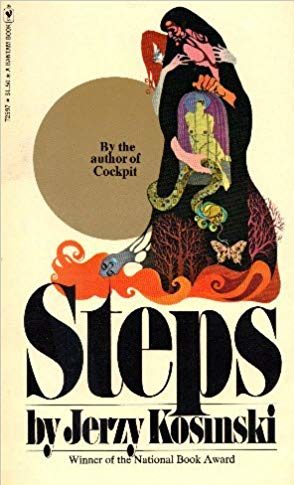 By JERZY KOSINSKI (Bantam; 1968)
By JERZY KOSINSKI (Bantam; 1968)
By all appearances, this National Book Award winning novel is an upscale item far removed from the world of horror. It was, after all, published as a prestigious hardcover, and later reissued as a Vintage Contemporary with critical blurbs that evoked names like Celine, Babel and Dinesen. Yet Jerzy Kosinski’s previous effort THE PAINTED BIRD is widely identified as a horror novel, and STEPS is nearly as horrific in its probing and unflinching study of moral ambiguity in the form of a dispassionate, and perhaps psychotic, individual. In fact, Kosinski was briefly placed under suspicion for the 1969 Tate-LaBianca murders due to the disturbing content of this novel (as evinced by a missive sent to the LAPD asking “Is it just remotely possible that the author of such weird material might himself be a very weird person indeed?”).
STEPS’ unnamed narrator has been described as “nothing more than a disembodied voice howling in some surrealistic wilderness.” That quote is only partially true, as the novel’s locales are precisely and realistically drawn—it’s the nameless, featureless and unknowable protagonist who constitutes the book’s most surrealistic element.
In one respect, STEPS’ narrator can be viewed as THE PAINTED BIRD’S child protagonist as a young man. In the previous novel the main character suffered all manner of abuse at the hands of sadistic peasants in Nazi-occupied Europe. In STEPS, recounted as a succession of elegant and precisely described vignettes, the twentyish narrator recounts his military conscription in an unidentified Eastern European country, where among other things he witnesses a civilian couple shot by a trigger-happy fellow soldier and two troublemaking conscripts get their genitals mashed up with rocks.
Further outrages described herein include the brutal gang rape of the protagonist’s girlfriend, which makes him think less of her and inspires him to callously abandon the traumatized lass to an even nastier gangbang at a raucous party; an innocent little girl who as revenge for the abuse meted out by her gruff father is fed bread-balls packed with broken glass and fishhooks by the protagonist; butterflies trapped in a jar and slowly burned to death; a babe contortionist who eagerly performs oral sex on the protagonist with her head stuck between her legs.
More insanity follows when the protagonist flees his homeland for the apparently brighter shores of the U.S.A. Here his skewed morality aids him in becoming a small time gangster and daredevil limo driver, during which time he witnesses a woman get decapitated during a limo race and kills a night watchmen with a bottle lobbed at his head.
Fragmentary and episodic though the above events are, thematically they’re all concerned with issues of control and domination, much of it political in nature. The narrator dislikes his early life under the iron rule of “the Party,” yet upon arriving in the U.S. he finds the allure of Marxist ideals, as evinced by a walk through a poor neighborhood, quite enticing: “I envied those who lived here and seemed so free.”
Kosinski, a staunch anti-communist, has his protagonist fantasize about putting himself in the position of the envied ghetto dwellers and “banish the dream of possession, of things to be owned, used and consumed…” Such thinking leads to apocalyptic fantasies in which the protagonist imagines himself invading rich peoples’ homes where “their last screams would suffocate in their ornate curtains…Their dead bodies, pinned down by broken statues, would be gazed upon by slashed family portraits” (I’m guessing it was such passages that briefly made Kosinski a murder suspect back in ‘69).
Obviously this isn’t an easy or comforting novel. Political content aside, STEPS’ study of a deviant mind puts it in the company of Ramsey Campbell’s THE FACE THAT MUST DIE and Hubert Selby Jr.’s THE ROOM.
